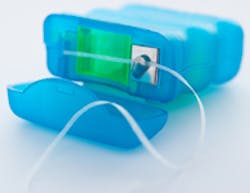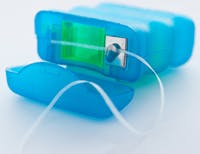Dental profession reacts to Associated Press report about flossing evidence
The federal Office of Disease Prevention and Health Promotion omitted flossing from its dietary guidelines, which coincided with an investigative report by the Associated Press that determined the evidence was “weak” for flossing being crucial in preventive oral health. The consumer media reacted strongly to the Associated Press report with articles featuring headlines such as “Are Americans wasting $448 million a year on dental floss?”
The dental profession and related industry members reacted to the news-breaking story this week.
The American Dental Association (ADA) included floss into the broader product category of “interdental cleaners” when saying the products are “proven to help remove debris between teeth that can contribute to plaque buildup.” The ADA then defined how plaque buildup leads to disease.
The ADA said, “Whether you use floss or another interdental cleaner is a personal preference, but it’s very important to understand the proper technique for each tool so that it is effective.”
The ADA also stressed that its exchange of information with the U.S. Department of Health and Human Services indicated that the government decided a focus on nutritional information, such as added sugars, was a higher priority. The ADA claimed the HHS still emphasizes flossing as "an important oral hygiene practice." The ADA information regarding its contact with HHS can be viewed here and here.
The American Academy of Periodontology (AAP) defended the traditional preventive oral health prevention technique saying, “Flossing allows for the removal of plaque bacteria and debris from areas in the mouth that brushing alone cannot reach.” The AAP said it continues to recommend daily flossing.
The AAP also countered the reporting by the Associated Press by adding the following information about dental research in its statement:
“Because the development of periodontal disease is slow in nature and because a variety of factors can impact its progression, studies that examine the efficacy of daily flossing are best conducted over a number of years and among a large population. Much of the current evidence does not utilize a large sample size or examine gum health over a significant amount of time. Additionally, many of the existing studies do not measure true markers of periodontal health such as inflammation or clinical attachment loss.”
The American Dental Hygienists' Association also issued a statement on Aug. 4. The dental hygiene association said, "Not all adjunct devices are appropriate for all patients, and it is important for dental hygiene professionals to work with their patients on which interdental cleaning method fits their needs. ADHA does support flossing with proper technique as instructed by your dental hygienist among other interdental implements being beneficial to removing bacteria, biofilm, and food debris from interproximal areas that toothbrushing cannot access."
Unsurprisingly, companies in the dental industry also chimed in on the media buzz generated by the Associated Press report, particularly if they produce products considered to be an alternative to floss.
For example, Xlear, which makes several products featuring xylitol, issued a statement from Nate Jones, the company’s CEO.
Jones said, “We are learning that traditional oral hygiene recommendations like flossing are not as effective as we have been told. Fortunately, the understanding of oral health is continually advancing and there are easier ways to clean the mouth and protect gums and teeth. Innovative dental professionals are putting more emphasis on prevention and the management of the bacteria in the mouth that cause cavities and decay. Dentists and hygienists are increasingly recommending xylitol as a way of effectively and conveniently improving oral health. If your dentist isn’t talking about the bacteria in your mouth and recommending xylitol, it might be time to find one that is.”
Waterpik, which manufactures an oral irrigator, reported in its corporate newsletter, “As uncomfortable as reports like this make us feel, they also shake us up, and help us find new, easier, and better ways to help our patients clean between their teeth.”
In a separate press release, Waterpik featured commentary from two dental hygienists on its staff—Deborah Lyle, RDH, and Carol Jahn, RDH.
Lyle, the company’s director of professional and clinical affairs, said, “"The Associated Press report that flossing is not scientifically proven to be effective has created discomfort and distress in the dental community.”
Lyle added, “Flossing is important. What has to be considered is whether string floss is the best way to clean interdentally and subgingivally. If your patient is using string floss effectively and there is no bleeding then nothing needs to change.” But Lyle’s statement emphasized that a “majority of people” opposed flossing and other alternatives should be considered.
Jahn, Waterpik’s director of professional relations and education, said, “The message that we want to make sure gets delivered is not that you don’t have to floss but that everyone needs to clean between their teeth and below the gumline, and there is a better way.”
Procter & Gamble, which manufactures dental floss, said in a statement: "Flossing is an essential part of a daily oral care routine. Cleaning between teeth helps remove plaque and debris that can cause tooth decay and gingivitis. The American Dental Association, along with several other organizations and countless dental professionals encourage regular use of dental floss. Ask your dental professional."
In its newsletter, Waterpik also referred to a 2013 systematic review by the Cochrane Group. The Cochrane Group cited “weak evidence” regarding flossing and plaque buildup. That review was also the subject of a 2015 RDH magazine article by Lynne Slim, RDH, titled, “Wave Goodbye to Floss?”
Slim concluded, “An astute clinician will customize an interdental biofilm disruption method for a particular patient, according to the size and shape of each interdental and proximal space. This may include a powered toothbrush, simple floss or tape, wood sticks, interdental brushes, oral irrigation, or some of the newer electric interdental cleaning devices.”
In addition, RDH also published a column by JoAnn Gurenlian, RDH, in November 2015 titled, “The flossing story is a myth!” Gurenlian reported on the 11th European Workshop in Periodontology in November 2014 in Spain. The meeting in Spain coincided with an American-based survey that, among other chores, determined that Americans would rather wash dishes than floss. Gurenlian humorously wrote:
"The AAP recommends that all Americans take better care of their gums by brushing their teeth at least twice daily, flossing daily, and discussing periodontal health with a dental professional. Maybe it is time the AAP get in touch with their patients, not to mention current evidence on flossing."
Maria Perno Goldie, RDH, also reported on the European conference in RDH eVillage. She said, “They emphasized that self-performed dental hygiene, while important, may not assure periodontal health. The experts concluded that flossing cannot be recommended due to lack of evidence, other than for areas where interdental brushes will not go through the interproximal area without causing trauma.”
For the most current dental headlines, click here.
About the Author

Mark Hartley
Mark Hartley is the editor of RDH magazine and collaborates with Kristine Hodsdon on many of the articles for RDH eVillage, which also appear on DentistryIQ.com.

